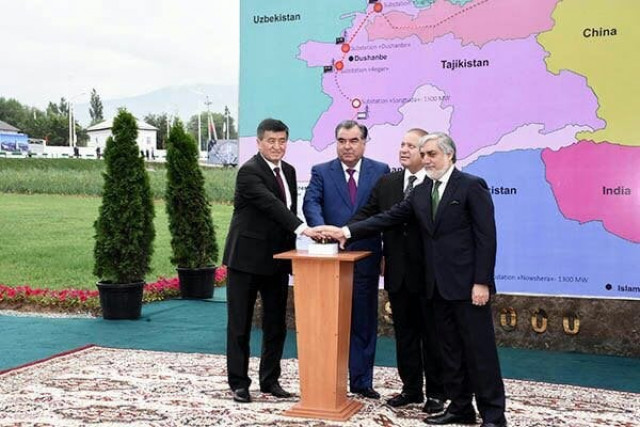German, US firms in race to win converter station contract of CASA project
One converter station each will be set up in Pakistan and Tajikistan

Prime Minister Muhammad Nawaz Sharif along with the leaders of Tajikistan, Kyrgyzstan and Afghanistan innuagrating CASA. PHOTO: AFP
The Central Asia-South Asia Regional Electricity Market is envisaged to be developed in a phased manner through institutional arrangements and infrastructure building that will utilise Central Asia’s power resources to tackle shortages in South Asia.
Work on CASA power project to begin on May 12
“In a fresh tender, four companies have submitted bids including US-based General Electric and Siemens of Germany, which have expressed interest in providing converter stations for their installation in Tajikistan and Pakistan,” a senior government official said.
One station each will be set up in Tajikistan and Pakistan. One year ago, bids had also been sought for setting up converter stations, which convert high-voltage direct current into alternating current or the reverse, but they were cancelled due to the high price offer.
All countries participating in the Casa project, which will bring electricity from Tajikistan and Kyrgyzstan to Pakistan and Afghanistan, have invited separate bids for laying transmission lines in their territories.
According to the official, Afghanistan will lay transmission lines spread over 500 kilometres and has invited three bids for three different parts of the transmission lines.
In one of the three bids, Indian and Chinese companies have participated and their evaluation is under way. “There is a high possibility that the Chinese company will win the bid,” the official said.
He pointed out that third-party access rules had been framed for the Casa project, which would allow a third country, which was not part of the original project, to export electricity.
He said Pakistan was also eager to purchase thermal electricity as Tajikistan would be providing hydroelectric power for only five months in a year. No hydroelectric power will be supplied by the Central Asian states in the winter season.
Originally, three converter stations were planned to be set up as part of the Casa project. However, the number of stations has been brought down to two, which will reduce cost of the project.
CASA-1,000 project: Central, South Asia to finalise contract for converter stations
Earlier, the Joint Working Group and the Intergovernmental Council of the Casa project met in Almaty in April 2016 to evaluate the sole bid received for establishing the three converter stations.
They noted that since the bid was very high and the countries that were part of the project had concerns about technical capability of the bidder, the three-station plan could be modified.
The regulator - National Electric Power Regulatory Authority (Nepra) - has already approved a tariff of 9.41 cents per unit for electricity import from the Central Asian states.
This includes energy charges at 5.15 cents per kilowatt-hour (kWh), transmission charges at 2.91 cents per kWh, transit fee for Afghanistan at 1.25 cents per kWh and wheeling charges for Tajikistan at 0.10 cent per kWh.
Already, Pakistan is importing 73 megawatts from Iran to meet the requirement of Gwadar at a cost of 6.25 cents per unit, which is higher than the 5.15 cents that will be paid to Tajikistan. The difference is because of the fuel as Iran consumes oil and gas for power generation while Tajikistan will supply hydroelectric power.
The total cost of electricity import from Iran amounts to 10.60 cents per unit. In Pakistan, gas is a cheaper source of power generation and it costs 5.33 cents per unit, but it is also higher than the 5.15 cents for electricity import from Tajikistan.
In Afghanistan, the power generation cost is estimated at around 6 cents per kWh.
Published in The Express Tribune, January 3rd, 2017.
Like Business on Facebook, follow @TribuneBiz on Twitter to stay informed and join in the conversation.



















COMMENTS
Comments are moderated and generally will be posted if they are on-topic and not abusive.
For more information, please see our Comments FAQ